How to determine TPN eligibility
Introduction to TPN
Total Parenteral Nutrition (TPN) stands as a critical intervention in medical nutrition therapy, enabling nourishment when the digestive system cannot be utilized. Assessing eligibility for TPN involves understanding the complexities of medical conditions and nutritional requirements. This article delves into various facets of TPN eligibility, covering essential criteria, medical indications, contraindications, and the careful calculations that ensure optimal nutritional support.
Understanding TPN Eligibility Criteria
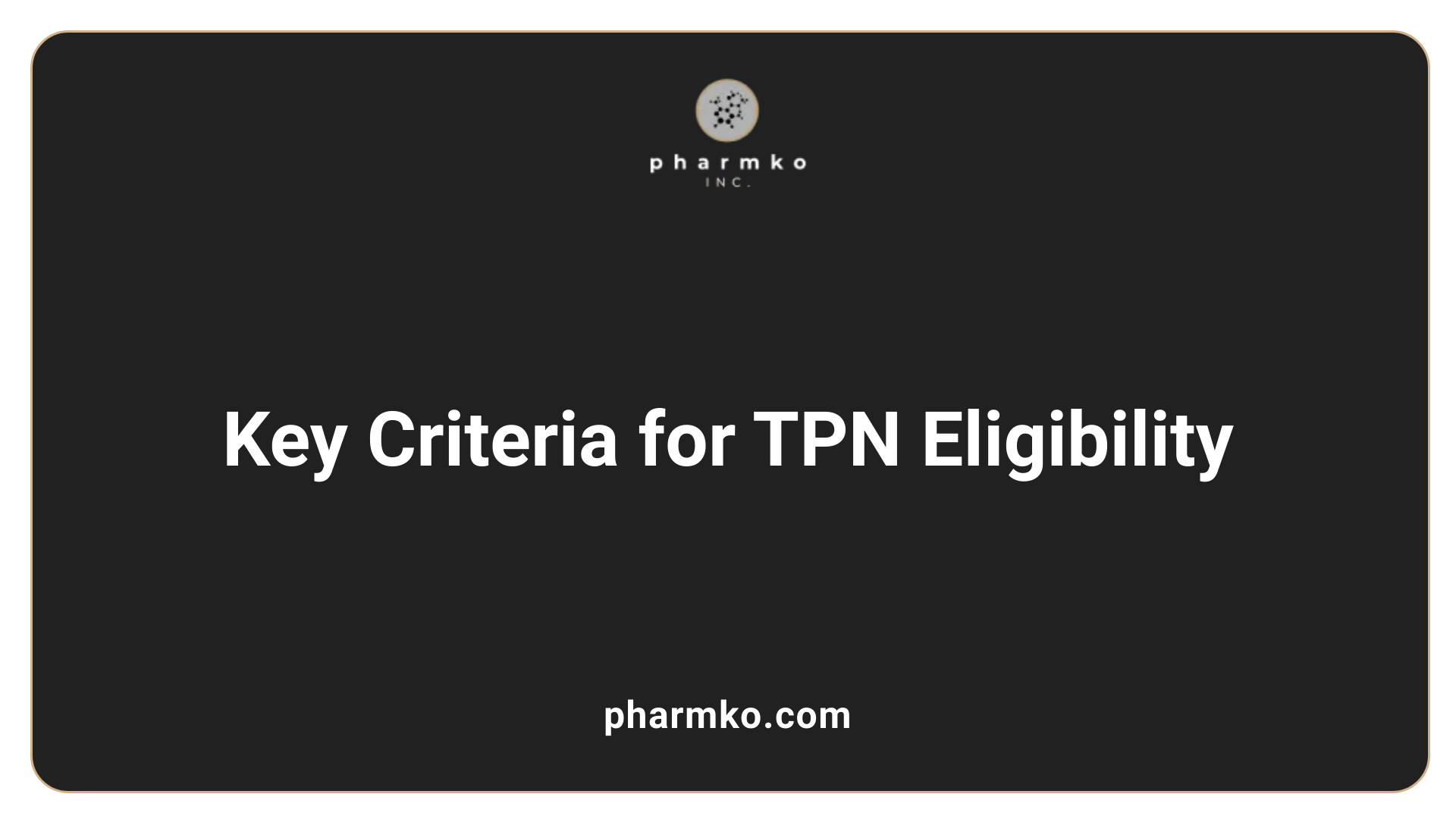
What are the criteria for TPN eligibility?
Total Parenteral Nutrition (TPN) is particularly vital for patients who cannot utilize their gastrointestinal (GI) tract due to severe medical conditions. Several key criteria determine eligibility for TPN:
- Non-Functional GI Tract : Indications include short bowel syndrome, where the absorptive surface of the intestine is significantly reduced or impaired.
- Gastrointestinal Disorders : Conditions like Crohn's disease during flare-ups, severe pancreatitis that prevents normal digestion, or intestinal pseudo-obstruction, where there is a functional blockage despite no physical obstruction.
- Surgical Interventions : Patients recovering from major gastrointestinal surgeries that inhibit nutrient absorption may also require TPN.
- Severe Malnutrition : This can arise due to conditions such as anorexia nervosa, cancer, or prolonged fasting without adequate nourishment.
- Pediatric Considerations : Premature infants, whose GI systems are underdeveloped, are often candidates for TPN to ensure they receive necessary nutrition while they grow and develop.
In summary, TPN serves as a critical life-sustaining therapy, providing complete nutritional support when traditional feeding methods are inadequate or impossible, especially in medically compromised patients.
Determining Medical Indications and Contraindications
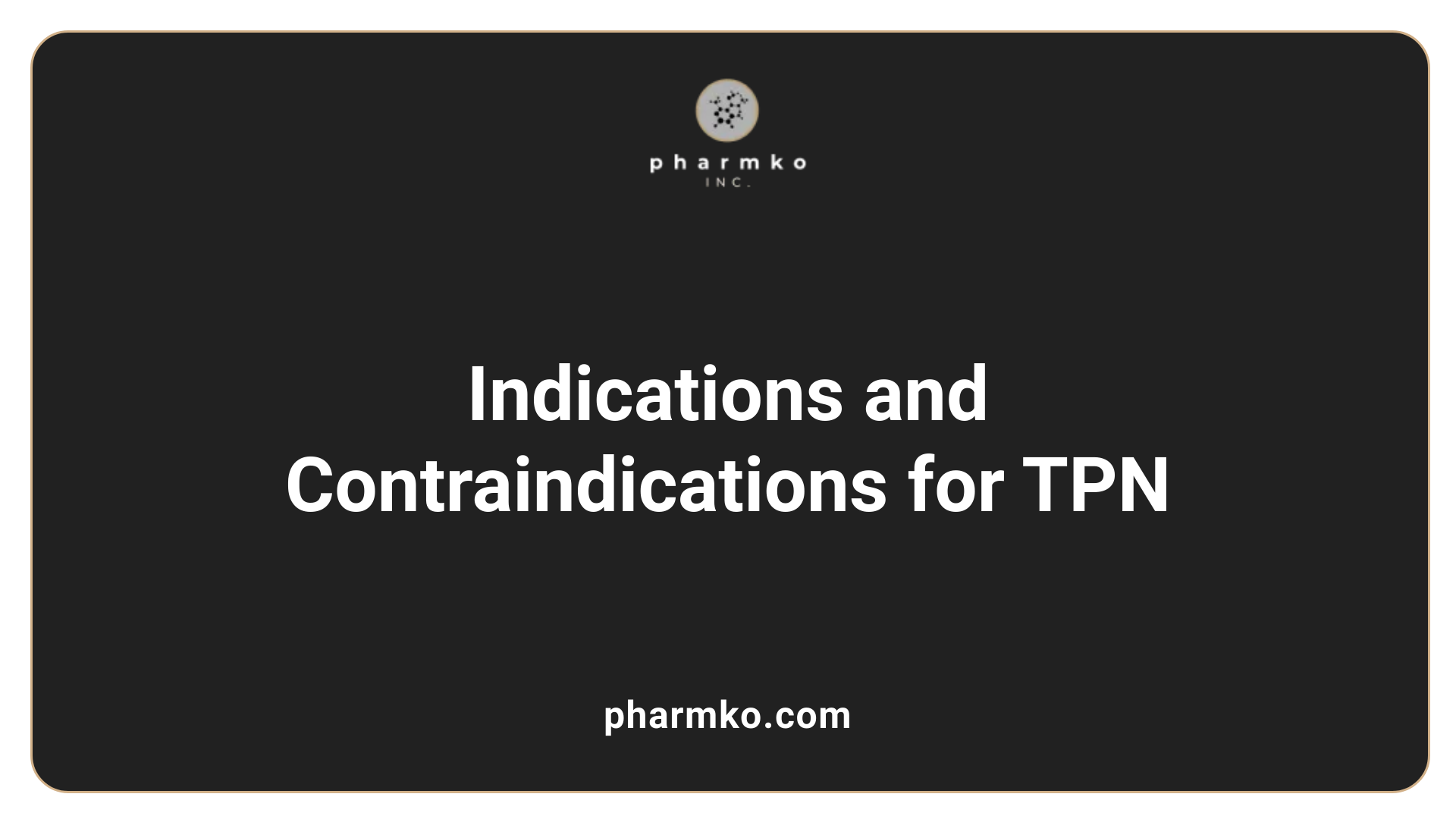
What are the indications and contraindications for Total Parenteral Nutrition (TPN)?
Total Parenteral Nutrition (TPN) is vital for patients who cannot derive their nutrition through enteral means. The primary indications for TPN include:
- Short Bowel Syndrome : Patients with significant bowel resection or conditions limiting nutrient absorption.
- Severe Gastrointestinal Disorders : Such as inflammatory bowel disease and bowel obstructions, which prevent normal digestive function.
- Post-Surgical Recovery : Allowing patients time to heal after extensive abdominal surgeries.
- Malnourished Patients : Especially those undergoing intensive treatments like high-dose chemotherapy or radiation.
Conversely, contraindications for TPN encompass situations where the gastrointestinal system functions adequately, such as:
- Functional GI Tract : Patients who can be nourished via oral or enteral routes should not be placed on TPN.
- Short-Term Needs : Non-malnourished patients requiring support of less than five days.
- Severe Cardiovascular Issues : Patients unstable due to heart conditions may be advised against TPN due to infusion risks.
Importance of proper assessment before TPN initiation
Before commencing TPN, a thorough nutritional assessment is crucial. This includes understanding:
- Patient's Nutritional Needs : Evaluating caloric requirements based on weight, height, and specific health conditions.
- Fluid and Electrolyte Status : Patients' hydration and electrolyte levels must be closely monitored to avoid complications.
- Clinical History : Reviewing the patient's medical history, surgical history, and current medication regimen.
This comprehensive understanding helps set realistic therapeutic goals and proactively mitigate potential complications such as infections or metabolic imbalances, ensuring the effective use of TPN therapy for those in need.
Essential Requirements for Implementing TPN
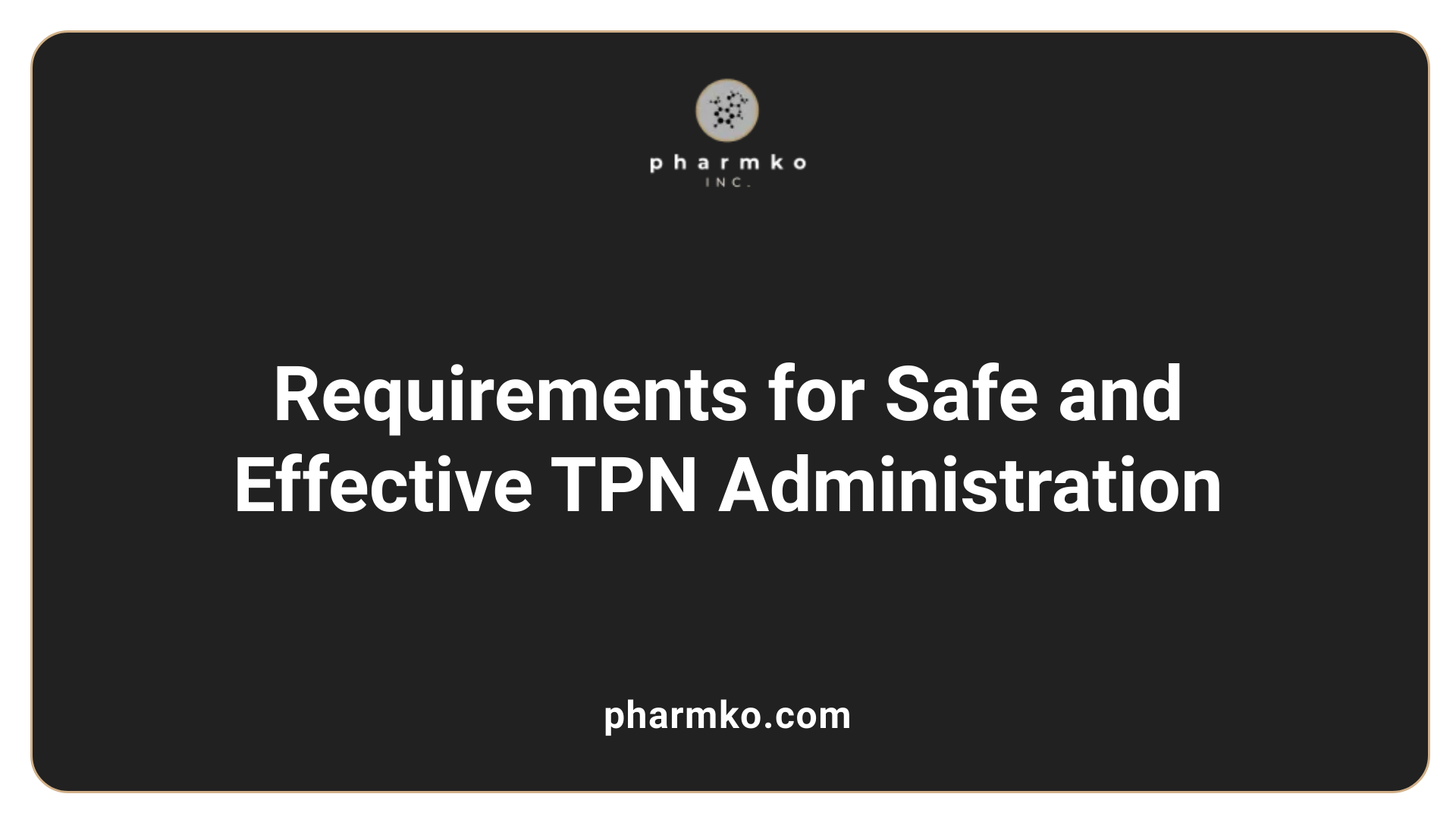
What is required to meet Total Parenteral Nutrition (TPN)?
To meet Total Parenteral Nutrition (TPN) requirements, a patient must have secure venous access, preferably via a central venous catheter for long-term support. This setup is crucial for ensuring the safe administration of nutrients. TPN offers a complete nutritional profile, providing all necessary macronutrients, including carbohydrates, proteins, and fats, along with essential micronutrients such as vitamins and minerals. This is particularly vital for patients unable to receive nutrition through the gastrointestinal tract due to conditions like short gut syndrome or bowel obstruction.
How do we monitor complications during TPN?
Monitoring for complications is critical during TPN administration. Healthcare providers must keep a close eye on:
- Infection risks : This includes monitoring for catheter-related bloodstream infections and localized infections.
- Metabolic stability : Patients can experience hyperglycemia, refeeding syndrome, and fluid overload, requiring timely interventions.
What guidelines should be followed during TPN administration?
The management of TPN requires strict adherence to established guidelines. Recommendations from organizations like the European Society for Clinical Nutrition and Metabolism (ESPEN) and BAPEN are foundational in clinical practice to ensure patients receive safe and effective nutrition support. These guidelines help healthcare providers make informed decisions regarding the initiation, management, and monitoring of TPN, ultimately promoting patient safety and health.
Distinctions Between TPN and PPN
What are the distinctions between TPN and peripheral parenteral nutrition (PPN)?
Total Parenteral Nutrition (TPN) and Peripheral Parenteral Nutrition (PPN) vary in several critical aspects that impact patient care. TPN is designed to provide complete nutritional support ; it is typically administered through a central venous catheter . This allows delivery of a highly concentrated nutrient solution directly into the bloodstream, making TPN suitable for patients who cannot absorb nutrients through their digestive system due to severe gastrointestinal issues or significant surgical interventions.
In contrast, PPN is delivered through peripheral veins and consists of a more diluted nutrient solution. It is intended for short-term nutritional supplementation , usually lasting less than two weeks . PPN often caters to patients who are still able to receive some oral or enteral nutrition but require additional support to meet their dietary needs.
Intended use and nutritional support
TPN is calorie-dense and designed to meet all the dietary requirements of patients. It includes a balanced mix of proteins, carbohydrates, fats, vitamins, and minerals, crucial for those with chronic conditions requiring prolonged assistance. On the other hand, PPN supplements a patient's nutritional intake without completely replacing regular meals; hence, its lower calorie density.
Duration and method of administration
The use of TPN can extend over weeks to months depending on the patient's condition, such as in cases of malnutrition or when the gastrointestinal tract is non-functional. On the other hand, PPN is more appropriate for patients with short-term nutritional needs , ensuring that the method of administration aligns with their immediate health requirements.
In summary, while both forms of parenteral nutrition aim to provide essential nutrients, TPN is suited for long-term needs, whereas PPN is for short-term supplementation, highlighting a key approach in nutritional management.
Calculating Nutritional Requirements for TPN
How are nutritional requirements for TPN calculated?
To effectively calculate the nutritional needs for total parenteral nutrition (TPN), healthcare providers begin with assessing the patient’s fluid requirements using the 4-2-1 rule. This method helps ensure adequate hydration based on body weight.
Once fluid needs are established, caloric intake is determined next. Healthy adults typically require 25-30 kilocalories per kilogram (kcal/kg) of body weight each day. Critically ill patients often have increased energy needs, sometimes necessitating higher caloric intake.
After establishing the caloric requirements, the TPN solution formulation begins.
Macronutrient breakdown and caloric intake
The macronutrient composition is vital:
- Lipids: They contribute approximately 30% of total caloric intake. Starting doses are typically 1-2 g/kg/day , adjusting as needed.
- Proteins: Generally recommended at 1-1.5 g/kg/day , providing essential amino acids for recovery and maintenance.
- Carbohydrates: Must account for 50-60% of the total caloric needs, usually supplied as dextrose starting at 10% concentrations.
Inclusion of vitamins and minerals
To prevent deficiencies, essential additives like vitamins, minerals, and electrolytes are included in the TPN formulation. This comprehensive approach ensures that all nutritional bases are covered for optimal recovery and health.
Monitoring is also critical to detect complications such as re-feeding syndrome, especially in malnourished individuals receiving TPN.
Medical Conditions Necessitating TPN
Common Medical Conditions
Total Parenteral Nutrition (TPN) is critical for patients whose gastrointestinal (GI) tracts are nonfunctional or severely compromised. Common conditions that may require TPN include:
- Short bowel syndrome : Often resulting from surgical resections or congenital malformations.
- Severe inflammatory bowel diseases : Such as Crohn's disease or ulcerative colitis, where patients suffer from extensive bowel inflammation.
- Prolonged bowel obstruction : Which prevents normal nutrient absorption.
- Intestinal ischemia : Impairing blood flow to the intestines.
- High-output enterocutaneous fistulae : Requiring bowel rest and the avoidance of enteral feeds.
Nutritional Deficiencies Requiring TPN
Nutritional deficiencies can arise rapidly in patients unable to absorb nutrients adequately from enteral feeding. Conditions necessitating TPN often include:
- Malnutrition due to cancer therapies : Particularly in patients undergoing chemotherapy, where nutritional needs may increase.
- Severe dysmotility : Leading to inability to digest or absorb adequate nutrients.
- Post-operative recovery : Especially following major abdominal surgeries.
Patient Profiles and Case Studies
Various patient profiles may illustrate the need for TPN:
- Post-surgical patients (e.g., after resection for cancer) may rely on TPN during recovery.
- Patients with severe pancreatitis unable to tolerate enteral feeds due to pain.
- Children on TPN awaiting intestinal transplants exemplify a unique patient group that requires careful nutritional management.
These profiles exemplify the necessity of TPN in clinical practice, ensuring adequate nutritional support when enteral feeding is not an option.
Evaluating Pediatric Patients for TPN
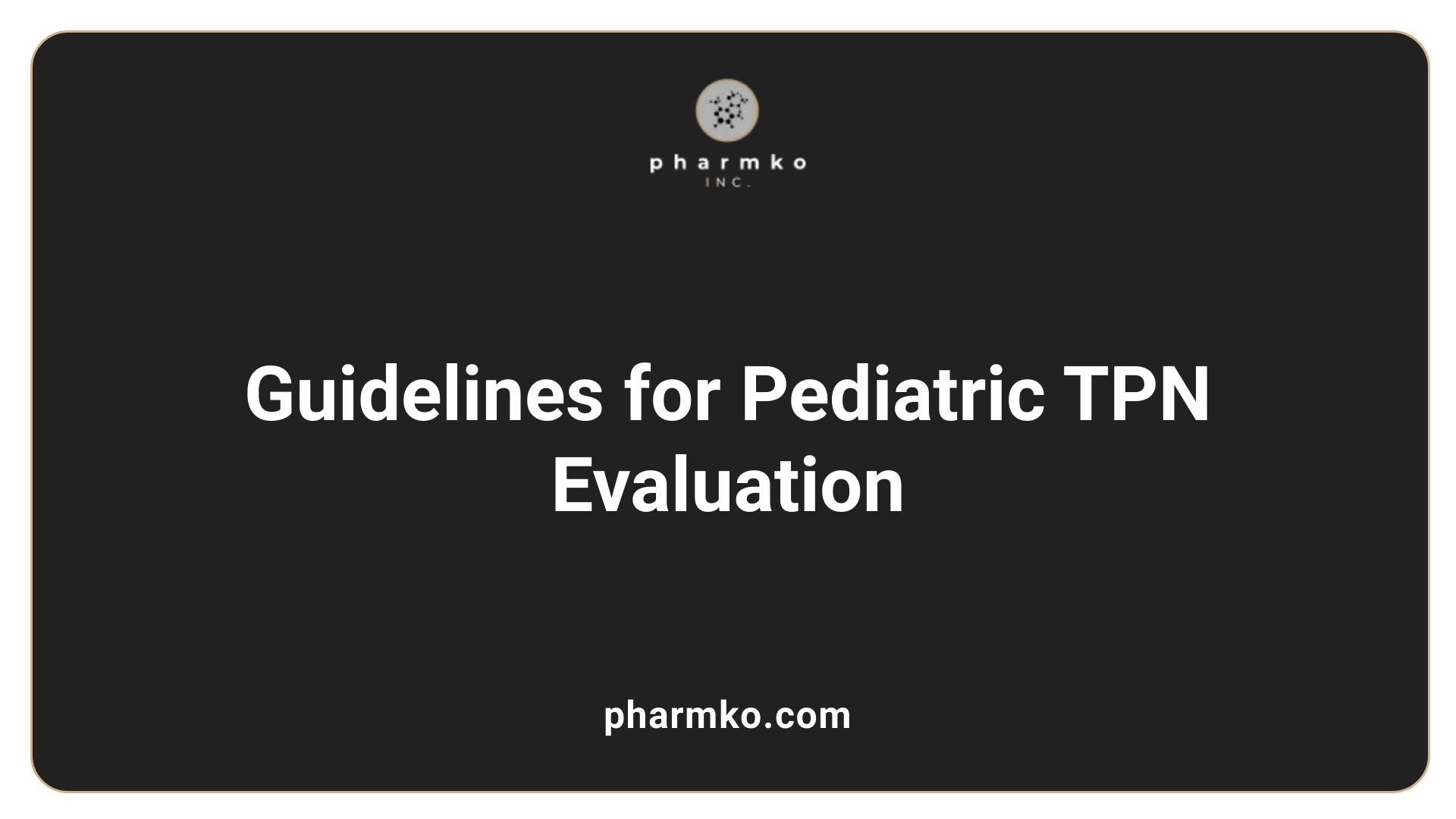
Specific Guidelines for Pediatric TPN
When considering Total Parenteral Nutrition (TPN) for pediatric patients, it is crucial to follow established guidelines tailored for the unique needs of children. Generally, TPN should only be initiated when enteral nutrition has failed or is contraindicated, particularly in cases of bowel obstruction or severe gastrointestinal disorders. Additionally, documentation must highlight the rationale for selecting TPN over enteral feedings due to inadequate nutrient absorption.
Differences in Nutritional Requirements
Nutritional needs for pediatric patients on TPN differ considerably from adults. Requirements include:
- Fluid Volume: Established using the Holliday Segar Method , adjusting to account for the patient’s age and health status.
- Energy Needs: Typically calculated around 25-30 kcal/kg , but may increase significantly during periods of stress or recovery.
- Protein Needs: Generally estimated at 1.5–2g/kg/day with adjustments based on growth and recovery goals.
Long-term Management
Long-term management of pediatric patients receiving TPN involves regular monitoring of growth parameters, metabolic rates, and any complications associated with TPN. Providers must adjust TPN formulations based on ongoing lab results and clinical assessments to maintain optimal nutrition. Documentation of changes in weight and nutritional status is crucial for ensuring continued eligibility for TPN under medical programs like Medicare.
Protocols and Documentation for Medicare Qualification
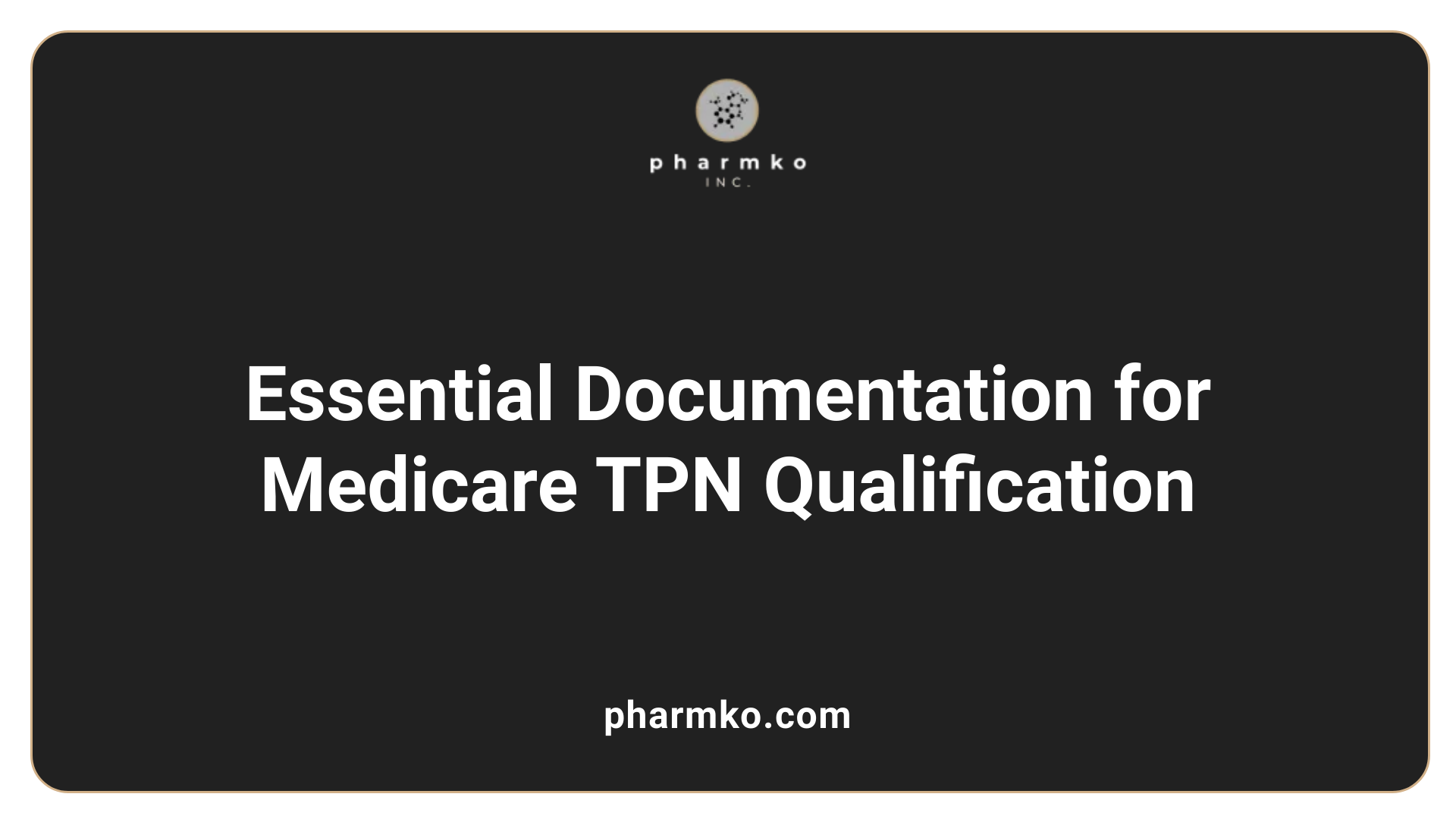
Documentation for Medicare qualification
To ensure coverage for Total Parenteral Nutrition (TPN) under Medicare, comprehensive documentation is essential. Health care providers must demonstrate that the patient's gastrointestinal system is nonfunctional or significantly impaired, preventing adequate nutrient absorption. Medical documentation should include the patient's health history, lab results, radiological findings, and progress notes.
Regulatory guidelines
Medicare mandates that patients qualify for TPN based on specific conditions, such as severe motility disorders or extensive small bowel resection. Documentation must explain why alternative methods of nutritional support, like tube feeding, are insufficient or contraindicated. Providers also need to establish that the expected duration for TPN necessitates long-term support.
Provider and patient responsibilities
Providers are responsible for maintaining accurate records of the patient's assessments, laboratory values, and dietary history. Patients, or their caregivers, should keep copies of all relevant medical correspondence and results to ensure a smooth qualification process. Regular evaluations, including basic metabolic profiles and assessments of weight relative to ideal body weight, are crucial to adjust the TPN solution as needed.
Establishing that the reasons for TPN are well-documented and justified is critical for aligning with Medicare's regulatory guidelines.
Conclusion: The Integral Role of TPN in Patient Care
Determining eligibility for Total Parenteral Nutrition involves a multifaceted assessment of both medical and nutritional needs, backed by comprehensive guidelines and protocols. Understanding the indications and contraindications, alongside the practical requirements for implementing TPN, ensures it is used appropriately and effectively. By addressing the specific needs of individual patients, TPN remains an essential component of comprehensive medical care, facilitating recovery and maintaining life when conventional nutrition fails. Clinicians must be diligent in their evaluation and ongoing management to maximize patient outcomes and mitigate potential complications.
References
- The Total Rundown on Total Parenteral Nutrition - tl;dr pharmacy
- Parenteral Nutrition: What it Is, Uses & Types - Cleveland Clinic
- Total Parenteral Nutrition (TPN) Macronutrient Calculator - ClinCalc
- Parenteral Nutrition (PN) - Nutritional Disorders - Merck Manuals
- [PDF] The Hitchhiker's Guide to Parenteral Nutrition Management for Adult ...
- Total Parenteral Nutrition (TPN) - LITFL
- Section 3 - TPN solution requirements - RxKinetics













